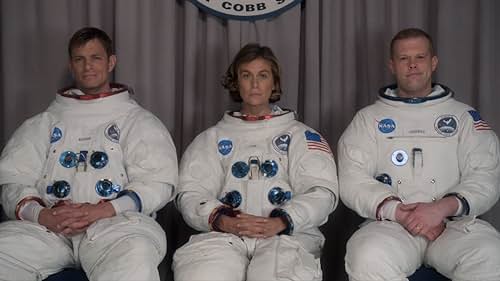“HERE MEN FROM THE PLANET EARTH FIRST SET FOOT UPON THE MOON JULY 1969, A.D. WE CAME IN PEACE FOR ALL MANKIND” — the words engraved on the Apollo 11 Lunar Module’s descent stage, left behind as the ascent stage detached and flew up into lunar orbit, carrying Neil Armstrong and Buzz Aldrin to the spacecraft that would eventually fly them home. The US had won the Space Race. But what if?
That’s precisely the question For All Mankind asks. Directed by Ronald D. Moore, best known for his work in Star Trek and the award-winning Battlestar Galactica, For All Mankind explores what could have happened if the Soviet Union had followed their earlier success in launching the first artificial satellite, sending the first human to outer space, and achieving the first crewed landing on the Moon. This pushes the US space effort, continuously on the back foot despite claiming technological superiority, to continue the space race.

The show begins with imagery surrounding the enormous impact that the Soviet landing left on people across the world, then focuses on the panicking NASA crew. This sets the stage for a motivated attempt to catch up, with the show quickly moving beyond the historical setting and people, instead focusing on the fictional characters who will drive it forward.
Chief among them is Ed Baldwin, the fictional commander of the Apollo 10 mission and an Air Force veteran whose dry wit and sarcasm don’t take away from his charisma. Faced with the intense political scapegoating attempts for the humiliation of the space program on the international stage, he nevertheless stays forthright and eventually leads several daring missions. Another is the astronaut Molly Cobb, an experienced pilot and part of the Mercury 13 program who joined NASA upon the Soviet Union’s monumental decision to have their second acknowledged lunar landing attempt commanded by a woman. Joining Baldwin on an unplanned adjustment to their Apollo 15 mission, Cobb goes spelunking off the side of a crater and finds water ice, setting the stage for the establishment of a lunar base.
The crazy decisions the astronauts make aren’t one-offs. For All Mankind is intensely dramatic in its storytelling — it has been described as a space opera — with horrific casualties and acts of immense heroism happening regularly. This plays into the political realities of the time it is set in; the powerful heroic role of Ellen Waverly, Danielle Poole, and the aforementioned Cobb, as well as the cool-headed leadership down on Earth by Margo Madison, quickly stops the disenfranchisement of women in the program.
As the seasons progress, For All Mankind quickly diverges from the history of the world as we know it, with the sustained global investment in space technologies leading to the use of existing designs that were too ambitious for the climate of the real world. The depiction of these developments is helped by an eye for detail, and a relatively realistic technological pathway, all paired with an optimistic timeline. Beyond that, history develops along a somewhat different path, with some events occurring differently through the butterfly effect, while others are more deeply impacted by the actual changes induced in human behavior.
For All Mankind tends to focus on the characters more than the scenery, which is more than appropriate, although still disheartening since the visuals of the show are incredible. The CGI for all of the launches — perhaps the most impressive of which was a rocket twice the width of the Saturn V launching from underwater — landings, explosions, crashes, and all sorts of mishaps, as well as the massive vistas of the lunar and martian surfaces, are very well made.
The production is also technically impressive, with realistic replicas of command centers and modules, in addition to thematically and era-appropriate stylistic choices. Aging makeup is slightly deficient, especially considering the multiple decades the show spans, though it appears to have been rectified in the newest season.
The show is quickly approaching the present day, covering about a decade every season. Airing exclusively on Apple TV+, For All Mankind is now airing its 4th season, and continues to provide a treat for alternate history, science fiction, and space age fans.

